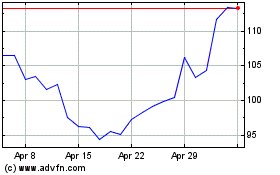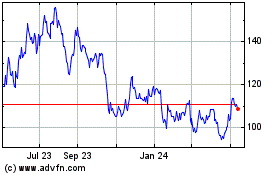Uber Spends Big on International Expansion
March 02 2016 - 7:30PM
Dow Jones News
Uber Technologies Inc. has spent big to expand its ride-hailing
service around the globe, a European regulatory filing showed,
providing a rare look at the company's finances.
Uber said its international business lost $237 million in 2014,
wider than its $32 million loss the previous year, according to a
filing it made last month with the Dutch Chamber of Commerce, which
handles corporate registrations in the Netherlands. That was the
most recent period for which the closely held company was required
to report financial data to authorities in Amsterdam, the site of
its international headquarters.
The filing applies to only one Uber subsidiary, Uber
International C.V., and the extent to which it represents the
company's overall international business is unclear. Still, the
numbers reveal a large jump in spending from 2013 to 2014, a period
in which Uber accelerated its international expansion. The company
now operates in about 400 cities, up from fewer than 100 at the
start of 2014.
Uber's international losses have likely grown even higher. Chief
Executive Travis Kalanick, in an interview last month with Canadian
publication Betakit, said his company is losing $1 billion a year
just in China, where it launched in 2013 and is spending heavily to
compete with homegrown rival Didi Kuaidi Joint Co. Uber said in
October that about 30% of its total global trips were in China.
Mr. Kalanick said in that interview that Uber is profitable in
the U.S. A spokeswoman for the company declined to say whether the
statement factored in costs such as running its San Francisco
headquarters.
"We're a rapidly growing company that is investing heavily to
bring our service to more people in more cities," the Uber
spokeswoman said in an email.
The Dutch filing is dated Feb. 3 but hadn't previously gained
wide attention. It was reported on earlier Wednesday by Reuters,
which cited Dutch broadcaster RT.
Revenue for Uber's international unit was $68 million in 2014,
according to the filing. The company didn't disclose revenue for
any previous year, nor provide the total amount of gross bookings,
or fares paid by customers, which likely was much higher.
Both private and public companies in many countries must file
paperwork with their national corporate registries, though only
some classes of companies need to include publicly accessible
profit-loss statements.
Uber has raised more than $10 billion in debt and equity as it
races to expand around the world. The ride-hailing company and its
competitors sink cash into subsidizing the cost of lower-priced
rides to attract new passengers and giving out lucrative bonuses to
attract new drivers.
LetterOne, an investment company founded by Russian billionaire
Mikhail Fridman said last month that it has invested $200 million
in Uber. Other overseas investors include Chinese search giant
Baidu Inc., Indian publishing group Bennett Coleman & Co. and
Qatar's sovereign-wealth fund.
Uber is raising customer fees in other parts of its business. On
Wednesday, the company told San Francisco customers of its UberEats
food-delivery service that it would add a new $1.50 delivery fee to
each order. An Uber spokeswoman said the company has charged
different delivery fees in each of the 10 U.S. cities where
UberEats is available, as it experiments with pricing that works
best in each market.
Sam Schechner contributed to this article.
Write to Douglas MacMillan at douglas.macmillan@wsj.com
(END) Dow Jones Newswires
March 02, 2016 19:15 ET (00:15 GMT)
Copyright (c) 2016 Dow Jones & Company, Inc.
Baidu (NASDAQ:BIDU)
Historical Stock Chart
From Mar 2024 to Apr 2024

Baidu (NASDAQ:BIDU)
Historical Stock Chart
From Apr 2023 to Apr 2024
